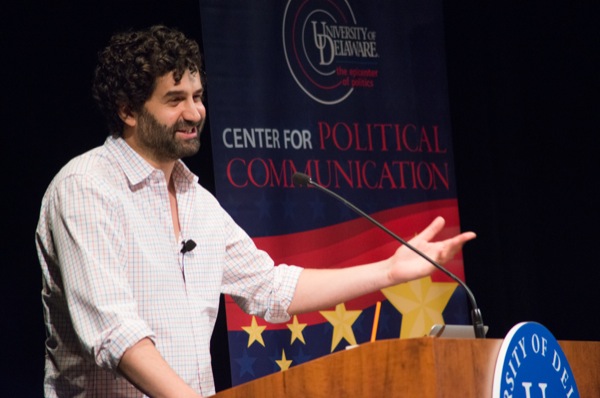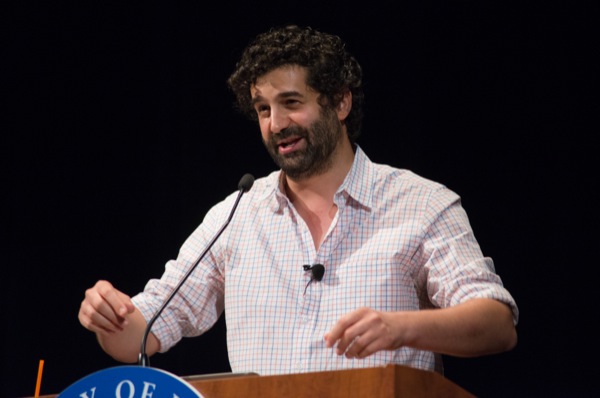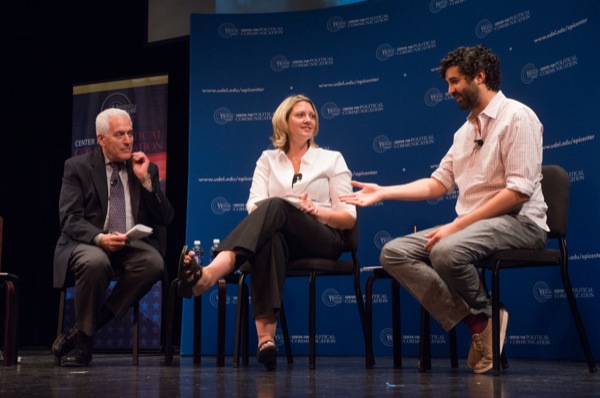


National Agenda 2014
Satirist Lesser talks about taking on the powerful through comedy
(Editor's note: A video of the presentation is now available on the National Agenda website.)
1:41 p.m., Sept. 12, 2014--Comedy writer Frank Lesser thinks that poking fun at the politically powerful has a serious side, but it should always be fun for the writer and the audience.
The Emmy Award-winning writer for Comedy Central’s The Colbert Report shared his experiences on Monday, Sept. 10, during his “Making Fun of Politics” presentation to a large audience of students, faculty and community members in Mitchell Hall.
Campus Stories
From graduates, faculty
Doctoral hooding
The talk kicked off the National Agenda 2014 speaker series, "Battle for Congress."
“Sometimes it’s just about knocking the mighty down a peg or two,” Lesser said. “Everybody’s human, and people shouldn’t take politics so seriously.”
A graduate of Brown University, Lesser is the author of the book Sad Monsters: Growling on the Outside, Crying on the Inside.
As a literary and entertainment venue, political satire has been around since ancient times, with one of its more illustrious practitioners being the 18th century author Jonathan Swift, he said.
“In his 'Modest Proposal,' Swift satirically suggested that instead of being a burden on their parents, children of the poor should be fattened up and baked or boiled,” Lesser said. “It’s actually pretty funny and its humor holds up today.”
Making such a mock-serious argument that is so ridiculous ends up mocking something less extreme but similarly disturbing and keeps such political satire relevant, he said.
Other noted purveyors of political satire have included writers as disparate in time and style as Charles Dickens and Dante Alighieri, Lesser said.
“The Christmas Carol was basically a screed against libertarianism about the political rift between two factions of that time,” Lesser said. “In his Divine Comedy, Dante used this most sophisticated form of comedy to pretty much say that ‘all my political enemies are burning in hell, and I will tell you exactly why and where.’”
Lesser said he has absolutely no idea whether or not the kind of political satire viewers see on The Daly Show, The Colbert Report and other comedy venues has any real world impact.
“I know that I am getting paid for it, and I don’t have to get a real job, so there really is a serious impact for me,” he said. “I do think there is something about the kid who points out the fact that the emperor has no clothes, and then someone in the crowd readily agrees and people see how ridiculous it is.”
Sometimes shows featuring political satire are a reaction to real world events of their time, Lesser said.
“It was not exactly coincidence that The Colbert Report, started right at the height of the George W. Bush-era paranoia fears of terrorism,” Lesser said. “Stephen Colbert pointed out some of the absurdities of that.”
While writers of political comedy may not directly change people’s lives, they may shake things up a bit by educating those who really are making a difference in the world
“It might be about people who are working every day to try to make a difference,” Lesser said. “So, when they come home after they’ve had a long, hard day, they can turn on the TV and seeing somebody making fun of all of the things they have been dealing with all day.”
The greatest contribution of political humor lies in its ability to bring politics to a more acceptable reality by taking subjects that most viewers find boring and make them more interesting through political satire, he said.
“What do you remember more -- boring details about finance laws, the amount of unregulated money and super pacs, or seeing Colbert’s political action committee while being advised by a ham loaf named Ham Rove? The people on the show just took a ham loaf and put Carl Rove kind of glasses on it. It was really funny and accurate too.”
Political satire created and expressed by very talented professional comedians in a humorous way can also teach people more about recent political happenings, he said.
“The main thing is to just be funny about all the things we are talking about in politics. That’s the key. You want to go after the targets in power. When you make fun of the little guy, then you’re just being a bully.”
After his talk, Lesser joined Ralph Begleiter, director of UD’s Center for Political Communication, and Danna Young, assistant professor of communication at UD, to field questions submitted by students and community members.
The 2014 National Agenda speaker series, presented by UD’s Center for Political Communication, is free and open to the public.
The next speaker in the series, on Wednesday, Oct. 1, will be CNN political reporter Peter Hamby.
This year, National Agenda alternates with a political film series and the first screening will feature O Brother, Where Art Thou? at 7:30 p.m., Wednesday, Sept. 17, also in Mitchell Hall. This series, “Fade to Black: Dark Political Humor in American Film,” will be moderated by Lindsay Hoffman, associate professor of communication.
Article by Jerry Rhodes
Photos by Duane Perry










